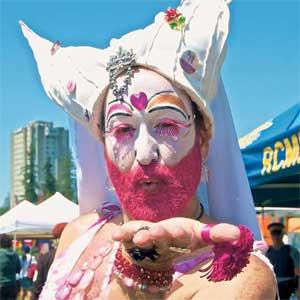Vancouver’s gay “nuns” will have extra cause to celebrate this Pride when their abbey achieves a status not seen in Canada for more than 25 years.
Sisters of Perpetual Indulgence from Europe, South America, Australia and the US are said to be flocking to the Lower Mainland to herald the local chapter’s elevation to a fully professed house.
The Sisters of Perpetual Indulgence began in San Francisco in the early 1980s, after a troupe of gay men borrowed retired habits from a convent for their production of The Sound of Music. The reaction from crowds in the streets was so supportive, they decided to use the framework of the nunnery to spread joy, banish guilt and serve the gay community. They’ve been serving ever since.
The San Francisco Sisters were amongst the first to visit HIV/AIDS patients in the hospital at the height of the AIDS crisis, and they worked to educate the gay community about the virus and to reduce its stigma.
Here in Canada, a Toronto chapter opened its doors in 1981 but disbanded in 1986 because the group was considered too controversial. While abbeys throughout the world have flourished in the last 20 years, the Sisters of Perpetual Indulgence didn’t return to Canada until 2010, here in Vancouver.
The Vancouver Sisters are unlike any traditional nuns you’ve ever seen. They don flowing white, horned wimples. They wear elaborate, glittery makeup. They sport brightly coloured, outrageous costumes.
“In our dress, we’re definitely very genderqueer,” says Sister Sweet Cherribum, who has been a member of the Vancouver Sisters for two years. “Some of us have beards. Some of us wear heels, some of us don’t. You don’t have to shave, you don’t have to tuck. You don’t have to add boobs or other parts — you basically come as yourself, as you choose.”
Some may interpret the Sisters’ actions as a mockery or criticism of the Catholic Church, but they say that is far from their intention.
“It’s not meant to be an attack at all. If anything, it is celebrating the best parts of being a Sister,” Sister Sweet Cherribum says. “I grew up Catholic, and nuns for me were the gentle ones, the caregivers. We spread the love, instead of spreading more self-hate.”
Using wit and humour, the Sisters aim to challenge societal norms, bring happiness to people’s lives and support the community.
“People always ask me if we’re making fun of the nuns,” says Sister Petunia Encarnata, who was also raised Catholic and even studied in the seminary to be a Franciscan brother (but left because of the pesky celibacy rule). “And I say no, far from that; we are honouring that tradition, but we make it our own and we give it a gay twist. We take our vows of spreading the joy seriously.”
The Sisters are a registered non-profit society, focused on fundraising for HIV/AIDS, youth organizations and homelessness in the gay community.
Sister Petunia Encarnata knew she wanted to participate as soon as she saw the Sisters on the streets of Vancouver but was terrified because she had never done drag before.
“That was a tremendous breakthrough in my life, that I was not afraid to embrace any gender, and flow from a very butch guy, which I can be, to a very feminine, crazy drag queen and everything in between,” she says. “So that’s really powerful.”
The celebration of the abbey’s elevation, known as its exequatur party, is open to the public and will take place Saturday, Aug 4.

 Why you can trust Xtra
Why you can trust Xtra


